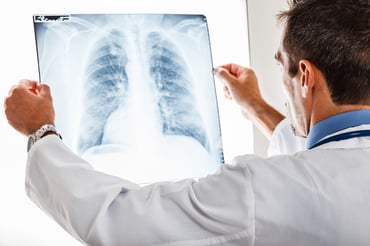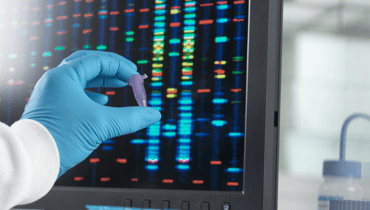
New information accumulated over the last few decades regarding lung cancer and what causes it to grow has significantly changed the recommended approach for treating it. Through the comprehensive clinical trials program at New York Oncology Hematology, our patients participate in invaluable research that brings more advanced options for lung cancer treatment to patients everywhere. Now, more than ever, lung cancer patients have even greater hope for a positive outcome.
Watch this short video about recent advancements in lung cancer treatment.
Immunotherapy Treatments: Changing the Way Lung Cancer is Treated
Immunotherapy is a relatively new category of cancer treatment that has broadened the treatment options for lung cancer thanks to clinical research. New immunotherapy drugs are still being developed, while cancer researchers are also studying new uses for existing immunotherapy drugs. All types of lung cancer, including small cell and non-small cell lung cancer, can be treated more effectively using immunotherapy.
Immunotherapy drugs activate your immune system to seek out cancer cells undetected by your body’s natural defense system. It does this by targeting specific proteins on the surface of the cancer cells. An oncologist may recommend tests to determine which type of protein is fueling the growth of the cancer so the appropriate immunotherapy drug gets administered.
Checkpoint Inhibitors for Lung Cancer
Checkpoint inhibitors stimulate the immune system to recognize cancer cells that can sometimes “hide” as healthy cells and go undetected. They work by targeting proteins identified on the surface of cancer cells. Several checkpoint inhibitor drugs are approved to treat lung cancer patients. An oncologist will recommend the most effective drug based on your situation.
Monoclonal Antibodies for Non-Small Cell Lung Cancer
Monoclonal antibodies are man-made proteins that bind to cancer cells. They restrict the growth of the blood vessels in cancer cells, ultimately destroying them. Monoclonal antibodies are commonly used to treat non-small cell lung cancer patients.
Not every non-small cell lung cancer patient qualifies for using these drugs. Your oncologist will talk with you about your best treatment options.
What to Expect When Using Immunotherapy to Treat Lung Cancer
Immunotherapy drugs have proven effective when used alone or in combination with other lung cancer treatments, such as radiation therapy and chemotherapy.
Immunotherapy is usually more tolerable than other types of treatments, but it still has side effects. Various factors determine what side effects patients receiving immunotherapy may experience.
There are many things to consider when deciding who can benefit from immunotherapy the most. Your cancer care team will help you determine if immunotherapy should be part of your lung cancer treatment plan and what to expect if it is.
Targeted Therapies Reach Non-Small Cell Lung Cancer Cells While Leaving Healthy Cells Untouched
Another relatively new cancer treatment category showing positive results, especially for non-small cell lung cancer, is targeted therapy. Targeted therapy drugs seek out cancer cells and attack the genetic molecules or proteins that allow them to multiply and spread through the body. For this reason, targeted therapy is sometimes called precision medicine.
Before beginning treatment for NSCLC, patients are tested for biomarkers that indicate if there are any genetic abnormalities within the tumor. These are not inherited genetic changes but genetic mutations that have developed in the patient’s cells over time.
These genetic abnormalities enable the growth of proteins, which can lead to the development of cancer cells. In cases where a mutation, addition, deletion, or rearrangement in the DNA of the tumor is present, treatment may be available to target the specific subtype of lung cancer.
Unlike traditional chemotherapy, targeted therapy is so precise that healthy, normal cells are usually unaffected. Typically, this means fewer side effects.
While there are many targeted therapies available for treating non-small cell lung cancer, most FDA-approved drugs are for metastatic non-small cell lung cancer. Metastatic lung cancer is no longer contained in the lungs and affects other areas of the body.
FDA-approved targeted therapies are currently available for non-small cell lung cancer tumors showing mutations in one of these genes:
- EGFR
- ALK
- ROS-1
- NTRK
- MET
- RET
- BRAF V600E
Targeted therapy can be used by itself or in combination with other treatments. While this isn’t the usual first line of treatment for non-small cell lung cancer patients, it could be in the future.
Other treatments, including chemotherapy and radiation, are available to kill the lung cancer cells in cases where biomarker testing doesn’t show a mutation in one of these genes.
Clinical Trials Study New and Effective Ways to Treat Lung Cancer
New York Oncology Hematology understands how important clinical trials are to improving treatments for small cell lung cancer and non-small cell lung cancer. Clinical trials help improve current treatments and make it possible for new therapies to become available for all types of cancer, including lung cancer. In cases where clinical trials show that a new treatment is better than the standard treatment, the new treatment may become the new standard.
When NYOH patients participate in clinical trials, it helps advance personalized lung cancer treatment for cancer patients everywhere. We have several open clinical trials for patients at various lung cancer stages.
Clinical trials are voluntary. It is your choice to participate if your cancer care team recommends it. Most clinical trials are only available in major hospital systems in large cities. However, you can find lung clinical trials at New York Oncology Hematology locations in Saratoga County, the Albany area, Amsterdam, and other Capital Region communities.
The Latest in Lung Cancer Treatments & Clinical Trials in New York
The lung cancer specialists at New York Oncology Hematology are here to guide you through your lung cancer care, which includes creating a personalized treatment plan to treat your specific type of lung cancer. If you or a loved one has been newly diagnosed with lung cancer, we encourage you to contact us to schedule an appointment. We are also available to provide second opinions on a treatment recommendation. We make the latest therapies, including clinical trials, available to our patients so they can stay close to home, near their support system of family and friends. Talk with your NYOH cancer care team to see what clinical trials we have available and if participating in one is right for you.

